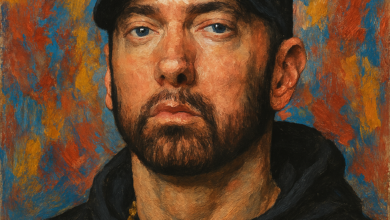Exploring the Life and Career of Russell Edward Brand

Early Life and Background
Russell Edward Brand was born on June 4, 1975, in Grays, Essex, England, into a family that would play a significant role in shaping his personality and future career. His mother, Barbara, was a former nurse, and his father, Ronald, was a photographer. The dynamics of his family environment changed drastically when his parents divorced when he was just six years old. This event marked the beginning of a tumultuous childhood, filled with instability and emotional challenges.
Growing up in a single-parent household, Brand faced several struggles, including the financial constraints that often accompany such a situation. His mother raised him with a firm emphasis on education, despite her own difficulties, and she nurtured his interests from a young age. As a child, Brand displayed an inclination toward performance arts, engaging in school plays and local theater productions. His early love for storytelling and comedy was evident, and it served as an outlet for his emotions during challenging times.
Throughout his education, Brand attended various schools, ultimately finding a sense of belonging at Itchen College in Southampton. Here, he flourished academically and honed his skills in drama, which further fueled his aspiration to pursue a career in entertainment. The supportive environment of the college allowed him to explore his comedic talents, leading to performances that garnered attention and appreciation from peers and teachers alike.
Brand’s early influences included British comedians and actors, whose styles resonated with his unique sense of humor. These figures played a pivotal role in shaping his comedic voice, providing inspiration as he navigated the complexities of adolescence. The combination of his family background, educational experiences, and early exposure to performance arts laid the foundation for Brand’s later success in the entertainment industry.
Rise to Fame: Comedy and Television
Russell Brand’s ascent to fame is a fascinating journey that showcases his evolution from a struggling comedian to a renowned figure in the entertainment industry. His early career was marked by numerous challenges, but it was his unique comedic style that ultimately set him apart from his peers. Brand’s stand-up comedy often incorporates a blend of wit, charisma, and a distinctive narrative flair that captivates audiences, enabling him to convey complex social issues through humor.
Brand gained significant recognition for his performances at various comedy festivals, particularly his appearance at the Edinburgh Festival Fringe. His comedic persona, characterized by exuberance and intellectual musings, quickly resonated with audiences, garnering him critical acclaim and paving the way for further opportunities. In the early 2000s, his career reached a pivotal milestone with his role as a presenter on the British television series ‘Big Brother’s Eforum.’ This platform allowed Brand to showcase his sharp, often controversial humor while engaging in debates that captivated viewers.
The success of his television appearances solidified his status as a household name, leading to the creation of his own show, ‘Russell Brand’s Ponderland.’ This series highlighted Brand’s eccentric personality and provided a platform for him to explore various topics, from pop culture to politics. His candid discussions often sparked debates, further establishing him as a provocative yet engaging figure in British media. Brand’s ability to intertwine humor with insightful commentary has made him a significant player in the comedy and television landscape, endearing him to fans while inevitably attracting criticism. His rise to fame illustrates the power of originality and the impact of personality in the competitive world of entertainment.
Hollywood and Beyond: Film Career and Personal Life
Russell Edward Brand’s foray into Hollywood marked not only a significant transformation in his career but also brought to light the complexities of his personal life. With his distinctive style and captivating personality, Brand gained prominence with films such as ‘Forgetting Sarah Marshall’ (2008), where he portrayed Aldous Snow, a rock star whose chaotic life brings both humor and chaos to the narrative. This role was pivotal, marking his first major breakthrough in American cinema and showcasing his talent for blending comedic timing with genuine emotion.
Following this success, Brand starred in ‘Get Him to the Greek’ (2010), which served as a sequel to ‘Forgetting Sarah Marshall’. His performance reinforced his ability to carry a film, resonating with audiences and critics alike. In this film, he further developed his character as a reckless yet appealing individual navigating the turbulent waters of fame and addiction. These portrayals allowed Brand to showcase the duality of his persona—one that is both hilarious and deeply flawed, reflecting his own life experiences.
Brand’s public persona was complicated by his high-profile marriage to pop-icon Katy Perry, which garnered immense media attention. Their relationship ultimately ended in divorce, which was met with a flurry of speculation and commentary from the press. This period in his life highlighted the struggle between personal happiness and the overwhelming scrutiny that accompanies celebrity status. Beyond romantic entanglements, Brand faced a more profound battle with addiction. His struggles with substance abuse informed much of his artistic output, providing a rich tapestry of personal experiences that influenced his work both on screen and in his stand-up routines.
Through his career in Hollywood, Russell Brand not only entertained millions but also navigated personal challenges that continue to shape his identity and professional endeavors. His journey exemplifies the intersection of fame, creativity, and personal evolution.
Activism and Influential Works
Russell Brand’s evolution into an activist is a significant aspect of his multifaceted career. Initially recognized for his work in comedy and film, Brand has shifted his focus in recent years to advocate for social change and critique prevailing societal norms. His activism covers various pivotal issues, including mental health, substance addiction, and the inadequacies of political systems, thereby positioning him as a prominent voice for reform and awareness.
In his books, particularly ‘Revolution’ and ‘Recovery’, Brand delves into personal and societal challenges, offering insights into how individuals can navigate through and overcome these adversities. ‘Revolution’ articulates his vision for a more equitable world, calling for radical change in how society functions. He argues for the necessity of dismantling oppressive systems and reimagining social structures to align with principles that prioritize well-being over profitability. This book serves as a manifesto for those disillusioned with traditional political paradigms.
Similarly, ‘Recovery’ presents a candid exploration of Brand’s personal struggles with addiction, providing valuable perspectives on the journey towards self-acceptance and healing. Through this work, he argues that recovery extends beyond the individual, advocating for a more compassionate society that supports the reintegration of those affected by addiction. This focus on shared accountability and empathy underscores a key tenet of his activism.
As a public intellectual, Brand utilizes his platform to engage with audiences on pressing issues, fostering dialogue around mental health and the complexities of human experience. His willingness to confront taboo subjects and challenge conventional wisdom has galvanized a diverse following, encouraging others to join the conversation about societal improvement. Ultimately, Brand’s commitment to activism not only reflects his personal journey but also serves as a catalyst for broader discussions on reform and the collective responsibility towards creating a healthier society.






















